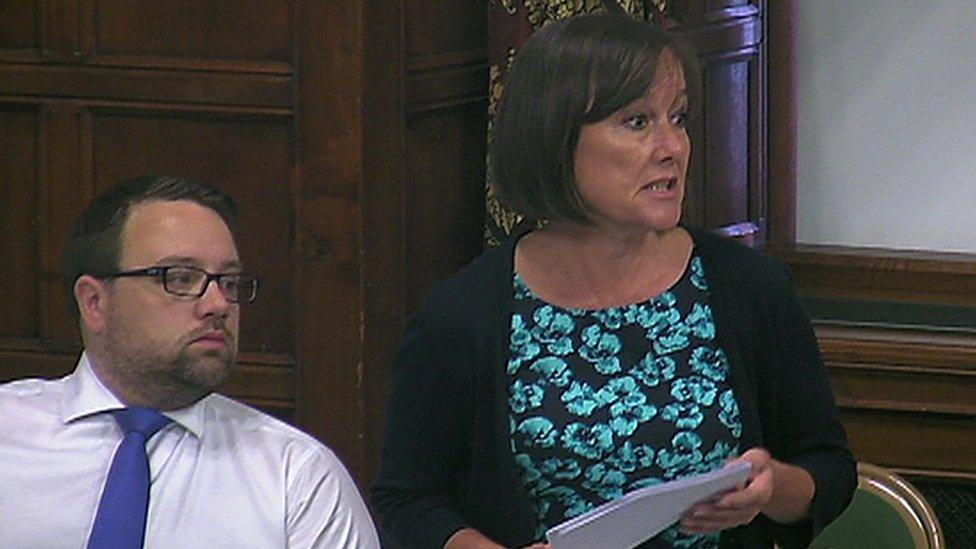Women's voices 'rarely heard' in Brexit debate
- Published
- comments

"I rarely heard women's voices, despite our best efforts to be heard" - Jo Stevens on the Brexit referendum
I know what you're thinking. But no, I'm not one of those BBC staffers on £150,000-plus a year.
But before you drown me with your unwarranted sympathy, let's talk about the last Westminster debate about Wales before heavily-fatigued MPs depart for their long summer recess.
Cardiff Central Labour MP Jo Stevens led a debate on the Queen's Speech and its implications for Wales. The speech, setting out the government's legislative plans for the next two years, was dominated by Brexit, not just the European Union (Withdrawal) Bill aka Repeal Bill but by seven other proposed new laws linked to leaving the European Union.
'Dog's dinner'
As you might expect from a Labour MP, Ms Stevens didn't find much in the speech to commend it: "After the dog's dinner of the Wales Act 2017 in the last Parliament, there has been no progress on tidying up and providing much-needed clarity on the devolution settlement, nothing to offer on rail electrification or anything concrete on scrapping the Severn bridge tolls and no Swansea bay tidal lagoon announcement, despite the government sitting on the favourable Hendry report since January."
What caught my eye were her comments on last year's EU referendum campaign - "the worst I have ever been involved in" and not just because of some of the nastiness about immigration and the murder of Jo Cox.
She want on: "I felt alienated by that campaign because the voices I heard time after time were men's; I rarely heard women's voices, despite our best efforts to be heard."
Ms Stevens said a University of Loughborough analysis, external of the campaign showed that men received 91% of EU referendum coverage in newspapers and 84% of broadcast media coverage.
'Cry for help'
"The voting patterns by gender in the referendum were also interesting," she added. "In all age categories up to age 64, women voted to remain in higher percentages than men. In the 18-24 age group, 80% of women voters voted to remain, compared with 61% of men. The majority of women were not heard during the campaign and the majority did not get the result they wanted in the referendum either."
Wales Office Minister Guto Bebb said he had nothing but respect for her position in wanting the UK to remain in the EU: "But I question whether her comments were more of a cry for help against the Labour manifesto rather than a complaint about the Queen's Speech."
He added: "It is worth reminding members that there was little difference between the Labour and Conservative manifestos at the general election when it came to leaving the European Union."
Mr Bebb and his boss Alun Cairns have not faced MPs' questions since April 26 and are not due to face them until September at the earliest. The Welsh Grand Committee has not met for more than a year, despite the government's announcement, external in February of plans to allow the speaking of Welsh in its meetings at Westminster. The Welsh Affairs Committee has yet to be established in this parliament.
So this was a rare opportunity to debate Welsh issues. Ms Stevens noted the government had cut the number of ministers in the Wales Office - Lord Bourne was not replaced after his post-election transfer to the Northern Ireland Office.
At times, it did feel that the election campaign - and last year's referendum - were being re-run.
'Language'
Plaid Cymru chose its language carefully during the election - talking about participation in rather than membership of the single market. But Arfon MP Hywel Williams had this solution to the challenges of the main Brexit legislation: "One way to avoid the provisions of the withdrawal Bill that would most damage Wales would be to make it largely unnecessary by maintaining our economic links with our soon-to-be-former partners. Staying in the single market and the customs union would render much of the Bill nugatory."
But that would also, to many Conservative and Labour MPs, external, be at odds with last year's vote to leave the EU.
Guto Bebb was the only Conservative MP to speak during the debate. He shed little light on possible developments with the tidal lagoon or electrification of the railway to Swansea. The latter is widely expected to be cancelled imminently.
He did respond to suggestions that the spending formula for Wales should be revisited in the light of the money for Northern Ireland announced as a result of the Conservatives' deal with the DUP. "Just before Christmas, we announced a fiscal framework for Wales that ensured a Barnett floor—something that has been called for by many interested parties in Wales for a very long time and was never delivered by the Labour Party when they were in power in Westminster and in Cardiff Bay."
Wales Office hopes that the fiscal framework settled the arguments over funding have proved, not unexpectedly, rather optimistic.